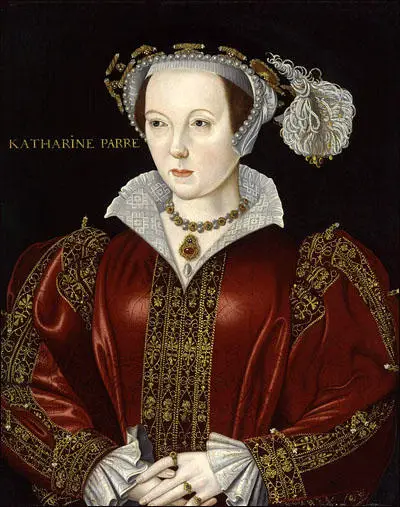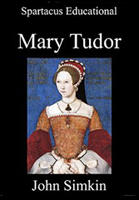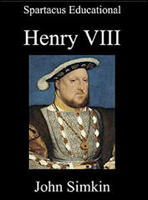The Act for the Advancement of the True Religion
In May 1543 Parliament passed the Act for the Advancement of the True Religion. This act declared that the "lower sort" did not benefit from studying the Bible in English. It stated that "no women nor artificers, journeymen, serving men of the degree of yeomen or under husbandmen nor labourers" could in future read the Bible "privately or openly". Later, a clause was added that did allow any noble or gentlewoman to read the Bible, this activity must take place "to themselves alone and not to others". (1)
Catherine Parr, the wife of Henry VIII , ignored this legislation "by holding study among her ladies for the scriptures and listening to sermons of an evangelical nature". Bishop Stephen Gardiner had a meeting with Henry VIII and raised concerns about Catherine's religious beliefs. Henry, who was in great pain with his ulcerated leg and at first he was not interested in Gardiner's complaints. However, eventually Gardiner got Henry's agreement to arrest Catherine and her three leading ladies-in-waiting, "Herbert, Lane and Tyrwhit" who had been involved in reading and discussing the Bible. (2)

Henry then went to see Catherine to discuss the subject of religion. Probably, aware what was happening, she replied that "in this, and all other cases, to your Majesty's wisdom, as my only anchor, Supreme Head and Governor here in earth, next under God". He reminded her that in the past she had discussed these matters. "Catherine had an answer for that too. She had disputed with Henry in religion, she said, principally to divert his mind from the pain of his leg but also to profit from her husband's own excellent learning as displayed in his replies." (3) Henry replied: "Is it even so, sweetheart? And tended your arguments to no worse end? Then perfect friends we are now again, as ever at any time heretofore." (4) Gilbert Burnett has argued that Henry put up with Catherine's radical views on religion because of the good care she took of him as his nurse. (5)
| Spartacus E-Books (Price £0.99 / $1.50) | ||||||
|---|---|---|---|---|---|---|
The next day Chancellor Thomas Wriothesley arrived with a detachment of soldiers to arrest Catherine. Henry told him he had changed his mind and sent the men away. Glyn Redworth, the author of In Defence of the Church Catholic: The Life of Stephen Gardiner (1990) has disputed this story because it relies too much on the evidence of John Foxe, a leading Protestant at the time. (6). However, David Starkey, the author of Six Wives: The Queens of Henry VIII (2003) has argued that some historians "have been impressed by the wealth of accurate circumstantial detail, including, in particular, the names of Catherine's women." (7)
Henry VIII died on 28th January, 1547. His only son, Edward VI was only nine years old and was too young to rule. In his will, Henry had nominated a Council of Regency, made up of 16 nobles and churchman to assist him in governing his new realm. The leading figures in the new government, Edward Seymour, Duke of Somerset, Thomas Seymour (Lord Sudeley) and John Dudley, 2nd Earl of Warwick, were all in favour of Protestantism, and the Act for the Advancement of the True Religion was repealed.
Primary Sources
(1) Antonia Fraser, The Six Wives of Henry VIII (1992)
In May 1543 the Council had decided that the "lower sort" did not benefit from studying the Bible in English. The Act for the Advancement of the True Religion stated that "no women nor artificers, journeymen, serving men of the degree of yeomen or under husbandmen nor labourers' could in future read the Bible "private or openly". In a sermon in the City of London the next year, it was suggested that the study of the scriptures was making the apprentices unruly. Women (in the sense of women of the people) yeoman and apprentices - all these led lives far removed from the court where Queen Catherine was apparently in the habit of holding study groups among her ladies for the scriptures and listening to sermons of an evangelical nature. Although a later clause in the 1543 act did allow any noble or gentlewoman to read the Bible (in contrast to "the lower sort"), this activity must take place "to themselves alone and not to others".
(2) Alison Plowden, Tudor Women (2002)
Since her marriage the Queen had undoubtedly moved steadily further towards Protestantism, and in the summer of 1546 her enemies at last saw an opportunity to pounce. In her little book of prayers and meditations, The Lamentation of a Sinner, which had recently been circulating in manuscript form, Katherine reminded her own sex that: `if they be women married, they learn of St Paul to be obedient to their husbands, and to keep silence in the congregation, and to learn of their husbands at home'. Unfortunately, there was to be an occasion towards the end of June 1546 when the Queen failed to follow this excellent advice - at least according to the story later told by John Foxe in his best-selling Book of Martyrs. Henry's dancing days were over now, and it was his wife's habit to sit with him in the evenings and endeavour to entertain him and take his mind off the pain of his ulcerated legs by inaugurating a
discussion on some serious topic, which inevitably meant some religious topic. On this particular occasion, Katherine seems to have allowed her enthusiasm to run away with her, and the King was provoked into grumbling to Stephen Gardiner: "A good hearing it is, when women become such clerks, and a thing much to my comfort to come in mine old days to be taught by my wife."This, of course, was Gardiner's cue to warn his sovereign lord that he had reason to believe the Queen was deliberately undermining the stability of the state by fomenting heresy of the most odious kind and encouraging the lieges to question the wisdom of their prince's government. So much so, that the Council was "bold to affirm that the greatest subject in this land, speaking those words that she did speak and defending likewise those arguments that she did defend, had with impartial justice by law deserved death". Henry was all attention. Anything which touched the assurance of his own estate was not to be treated lightly, and he authorized an immediate enquiry into the orthodoxy of the Queen's household, agreeing that if any evidence of subversion were forthcoming, charges could be brought against Catherine herself.
Student Activities
Henry VIII (Answer Commentary)
Henry VII: A Wise or Wicked Ruler? (Answer Commentary)
Henry VIII: Catherine of Aragon or Anne Boleyn?
Was Henry VIII's son, Henry FitzRoy, murdered?
Hans Holbein and Henry VIII (Answer Commentary)
The Marriage of Prince Arthur and Catherine of Aragon (Answer Commentary)
Henry VIII and Anne of Cleves (Answer Commentary)
Was Queen Catherine Howard guilty of treason? (Answer Commentary)
Anne Boleyn - Religious Reformer (Answer Commentary)
Did Anne Boleyn have six fingers on her right hand? A Study in Catholic Propaganda (Answer Commentary)
Why were women hostile to Henry VIII's marriage to Anne Boleyn? (Answer Commentary)
Catherine Parr and Women's Rights (Answer Commentary)
Women, Politics and Henry VIII (Answer Commentary)
Historians and Novelists on Thomas Cromwell (Answer Commentary)
Martin Luther and Thomas Müntzer (Answer Commentary)
Martin Luther and Hitler's Anti-Semitism (Answer Commentary)
Martin Luther and the Reformation (Answer Commentary)
Mary Tudor and Heretics (Answer Commentary)
Joan Bocher - Anabaptist (Answer Commentary)
Anne Askew – Burnt at the Stake (Answer Commentary)
Elizabeth Barton and Henry VIII (Answer Commentary)
Execution of Margaret Cheyney (Answer Commentary)
Robert Aske (Answer Commentary)
Dissolution of the Monasteries (Answer Commentary)
Pilgrimage of Grace (Answer Commentary)
Poverty in Tudor England (Answer Commentary)
Why did Queen Elizabeth not get married? (Answer Commentary)
Francis Walsingham - Codes & Codebreaking (Answer Commentary)
Sir Thomas More: Saint or Sinner? (Answer Commentary)
Hans Holbein's Art and Religious Propaganda (Answer Commentary)
1517 May Day Riots: How do historians know what happened? (Answer Commentary)




